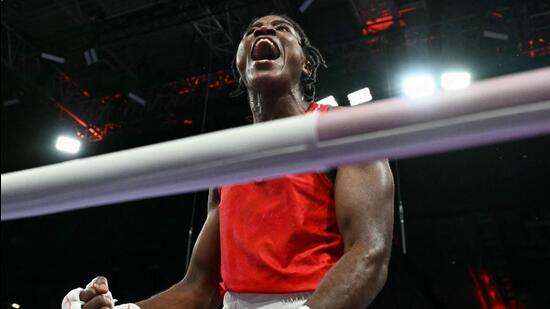
Cindy Ngamba’s fight for the displaced people
4 months ago | 40 Views
Kolkata: “Our journey is too difficult,” said Hadi Tiranvalipour, barely able to contain his disappointment after losing the 58kg taekwondo qualification bout on Wednesday. The path to Paris would never be easy, no route to the Olympics is, but Tiranvalipour was not talking about that. He is, you see, part of the 37-member IOC Refugee Olympic Team.
“I had too much sacrifices about my losing weight process,” he said in an AP report. Expect India to absorb the full import of what that means, now and forever.
His story begins in Iran for whom he had won an Asian junior gold in 2015. Tiranvalipour, 26, would go on and get a masters’ degree in sports science and physical education, as per Olympics.com, and work as a television presenter. But when he spoke in favour of women’s rights, Tiranvalipour had to leave the country.
From Turkey to Italy, living in a forest, sleeping on a sofa, Tiranvalipour went through what most athletes in Paris wouldn’t in their worst nightmares. Granted asylum by Italy, he was chosen for the refugees’ team, an idea whose time the International Olympic Committee (IOC) thought had come at the 2016 Games. An idea that seeks to include the approximately 120m people forcibly displaced in the Olympics, often called the greatest show on earth. The Tokyo Games had shooters on the refugee team trained by Olympic gold medallists Abhinav Bindra and Italian Niccolo Campriani.
“We passed so many difficult journeys. If you have a target, you have to keep going,” Tiranvalipour said.
Teammate and flag-bearer for them at the Games, Cindy Ngamba would agree. “I want to say to all the refugees around the world... keep on working hard, keep on believing in yourself,” Ngamba said after assuring herself of a bronze in the women’s 75kg boxing competition (Lovlina Borgohain’s weight category).
It was the first for the team at the Games.
“It means the world to me to be the first ever refugee to win a medal,” Ngamba said on Sunday after shutting out vociferous support for France’s Davina Michel to win the quarter-final 5-0 at the Arena Paris Nord. Ngamba beat a former world champion in the first round.
At Roland Garros on Thursday, she will try to change the colour of the medal in the semi-final against Panama’s Atheyna Bylon. I will, Ngamba has said.
A part of Ngamba’s life is like Tiranvalipour. Even like Sifan Hassan’s. She has trained at the Britain’s team facilities in Sheffield just as Tiranvalipour has with Italy’s Vito Dell’aquila, the defending Olympic champion in his weight category, at the sports centre in Rome.
Hassan, the multiple Olympic medallist attempting an ambitious long-distance treble in Paris, fled Ethiopia when she was 15, Ngamba left her native Cameroon at 11. Their prowess got noticed early, Hassan’s at Eindhoven Atletiek (she is still a member) and Ngamba’s at a youth club in Bolton where she would spar with boys.
In an alien land, life was hard for both. Ngamba and Hassan were shy and struggled to fit in. Put in a centre for underage asylum seekers, Hassan said she would cry every day. “I was like a flower that got no sun,” she told De Volkskrant, a daily. Things changed when Hassan moved to Eindhoven, met other Ethiopians and joined the athletics club.
Ngamba didn’t know English, got bullied for her weight and became the introvert she wasn’t in Cameroon. Then, she chanced upon the ring at her club. For over an year, the coach didn’t let her enter it, asking Ngamba to do push-ups, sit-ups and skipping instead. She did, according to a report in The Guardian. Unknown to the coach, Ngamba would, after her “boxing session”, also run on the treadmill. Realising that she is not a quitter, he relented.
Where Hassan and Ngamba’s stories diverge is that Hassan got a Dutch passport soon but after several attempts, British citizenship continues to elude Ngamba. Despite the backing of Britain’s boxing federation, with whom she is employed as a sparring partner, despite having gone to university in England, her application keeps being rejected.
South African middle-distance runner Zola Budd’s citizenship was fast-tracked to get her to represent Britain in the 1984 Olympics.
Ngamba was put in a detention centre in 2019 and has said that the threat of deportation looked real then. She was granted refugee status after that. Not because she won national titles in three weight categories in England but because she is a lesbian (there are 193 openly gay athletes in this Olympics) and same sex relationships are illegal in Cameroon.
Ngamba’s performance got Filippo Grandi, the United Nations High Commissioner for Refugees, to write on X: “You do us all very, very proud! And now onward to gold.”
The refugees’ team has athletes who started sport in rehabilitation centres. In Edilio Centeno Nieves, it had a shooter in Paris who has a day job as a waiter in Mexico. The Olympics, according to Yiech Pur Biel, a South Sudanese runner who was part of the 2016 refugees’ team, can be a platform in the campaign to humanise refugees even as the world clamps down on asylum. And, triggered by fake news, riots break out in England.
One day, Biel has said he hopes, there will be no need for such a team. Ngamba, Nieves, Tiranvalipour and every other athlete on the team can play a role in the John Lennon idea that imagines all the people, sharing all the world.
Read Also: Coaches at Olympics feel double weigh-in rule unfair
#




















